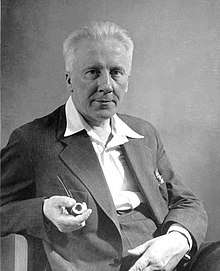Władysław Witwicki
Władysław Witwicki (30 April 1878,[1] Lubaczów – 21 December 1948,[2] Konstancin)[3] was a Polish psychologist, philosopher, translator, historian (of philosophy and art) and artist. He is seen as one of the fathers of psychology in Poland.[4][5]

Witwicki was also the creator of the theory of cratism,[6][7] theory of feelings,[8][9] and he dealt with the issues of the psychology of religion,[10] and the creation of secular ethics.[11] He was one of the initiators and co-founders of Polish Philosophical Society.[12] He is one of the thinkers associated with the Lwów–Warsaw school.[13]
Background
Władysław Witwicki was the fifth child of Urszula Witwicka, born Woińska (niece of the Metropolitan Archbishop of the Roman Catholic Archdiocese of Lviv, Łukasz Baraniecki), and Ludwik–Filip Wasylkowicz Witwicki,[14] as well as father of Janusz Witwicki, the creators of the Plastic Panorama of Old Lviv.[15]
He graduated from the University of Lviv, was a student of Kazimierz Twardowski.[1][16] He also studied at the University of Vienna (under the direction of Alois Höfler) and at the Leipzig University (under the direction of Wilhelm Wundt).[17] He lectured at the University of Lviv and became a professor at the University of Warsaw (1919–1948).[18][19]
Works
Witwicki is the author of the first Polish textbooks on psychology.[20] He also collaborated with other philosophers. For instance, he worked with Bronisław Bandrowski to develop a model of psychology based on Franz Brentano's theory on phenomenology. It included an analysis of Edmund Husserl's Theory of Content and the Phenomenon of Thinking.[17]
In the comments to his own translation of the Gospels of Matthew and Mark – Dobra Nowina według Mateusza i Marka[21] (The Good News according to Matthew and Mark) – Witwicki challenges the mental health of Jesus. He attributed to Jesus subjectivism, increased sense of his own power and superiority over others, egocentrism and the tendency to subjugate other people,[22] as well as difficulties communicating with the outside world and multiple personality disorder, which made him a schizothymic or even schizophrenic type (according to the Ernst Kretschmer's typology).[7][23]
Selected publications
- Translations of Plato's dialogues
- Psychologia do użytku słuchaczów wyższych szkół naukowych, vol. 1–2 (1925–1927)
- Wiara oświeconych, 1959 (fr.: La foi des éclairés, 1939)
- Przechadzki ateńskie (a series of radio programs, 1939, issued in 1947)
- Translations of the Gospel of Matthew and the Gospel of Mark with psychological analysis[24]: Dobra Nowina według Mateusza i Marka (The Good News according to Matthew and Mark); written in 1942, issued in 1958
See also
- History of philosophy in Poland
- List of Poles
- List of psychologists
References
- Nowicki (1982), p. 117.
- Nowicki (1982), p. 120.
- Chodakiewicz, Radzilowski & Tolczyk (2009), p. 174.
- Nowicki (1982), p. 61.
- Citlak (2015), p. 156.
- Rzepa (1991), pp. 68–81.
- Citlak (2015), pp. 155–184.
- Rzepa (1992), pp. 215–216.
- Nowicki (1982), pp. 73–74.
- Nowicki (1982), pp. 79–90.
- Nowicki (1982), p. 91.
- Nowicki (1982), p. 7.
- Rzepa (1991), pp. 16–17.
- Rzepa (1991), p. 233.
- Rzepa (1991), p. 234.
- Rzepa (1991), pp. 233–234.
- Płotka (2020), pp. 141–167.
- Nowicki (1982), pp. 13–23.
- Rzepa (1991), pp. 233–236.
- Rzepa (1991), p. 120.
- Witwicki (1958).
- Szmyd (1996), p. 197.
- Jarzyńska, Karina (2008-04-10). "Jezus jako egocentryczny schizotymik" [Jesus as an egocentric schizotymic]. Racjonalista (in Polish). Fundacja Wolnej Myśli. Retrieved 2020-07-28.
- Szmyd (1996), p. 196.
Sources
- Chodakiewicz, Marek Jan; Radzilowski, John; Tolczyk, Dariusz, eds. (2009). Poland's Transformation: A Work in Progress. New Brunswick, London: Transaction Publishers. ISBN 978-1-4128-3096-6.CS1 maint: ref=harv (link)
- Citlak, Amadeusz (2015). "Psychobiography of Jesus Christ in view of Władysław Witwicki's theory of cratism". Journal for Perspectives of Economic Political and Social Integration. Scientific Society KUL. 21 (1–2). doi:10.2478/pepsi-2015-0007. ISSN 2300-0945. OCLC 998362074.CS1 maint: ref=harv (link)
- Nowicki, Andrzej (1982). Witwicki (in Polish). Warszawa: Wiedza Powszechna. ISBN 83-214-0301-8.CS1 maint: ref=harv (link)
- Rzepa, Teresa (1991). Psychologia Władysława Witwickiego [Psychology of Władysław Witwicki] (in Polish). Poznań: Wydawnictwo Naukowe UAM. ISBN 83-232-0332-6.CS1 maint: ref=harv (link)
- Rzepa, Teresa (1992). "Witwicki Władysław". In Kosnarewicz, Elwira; Rzepa, Teresa; Stachowski, Ryszard; et al. (eds.). Słownik psychologów polskich [Dictionary of Polish psychologists] (in Polish). Poznań: Instytut Psychologii UAM. pp. 214–218. OCLC 834052536.CS1 maint: ref=harv (link)
- Płotka, Witold (2020). "From psychology to phenomenology (and back again): A controversy over the method in the school of Twardowski". Phenomenology and the Cognitive Sciences. 19 (1). doi:10.1007/s11097-019-09620-x. ISSN 1572-8676.CS1 maint: ref=harv (link)
- Witwicki, Władysław (1958). Dobra Nowina według Mateusza i Marka [The Good News according to Matthew and Mark] (in Polish). Warszawa: Państwowe Wydawnictwo Naukowe. OCLC 681830910.CS1 maint: ref=harv (link)
- Szmyd, Jan (1996). Psychologiczny obraz religijności i mistyki: z badań psychologów polskich [Psychological picture of religiousness and mysticism: from the research of the Polish psychologists] (in Polish). Kraków: Wydawn. Naukowe WSP. ISBN 978-8-3868-4154-7.CS1 maint: ref=harv (link)